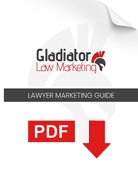

Lawyer Marketing Guide
Navigating Google’s Pirate Algorithm
Want to better understand how Google monitors copyright compliance? Join us as we explore their Pirate algorithm update.
Introduction
Search Engine Optimization (SEO) is a dynamic and complex field, heavily influenced by Google’s ever-evolving algorithms. These algorithms, which are essentially mathematical formulas and rules, determine where a webpage ranks in the search results. Understanding these algorithms and how they affect SEO is critical for any online business, including law firms.
One of these crucial algorithms is Google’s Pirate Algorithm. Launched in 2012, this algorithm was specifically designed to combat copyright infringement. The Pirate Algorithm targets websites that have received numerous copyright violation complaints, especially those involved in the distribution of pirated content.
The Pirate Algorithm has a significant impact on search engine rankings. It devalues sites with high volumes of valid copyright removal notices, pushing them down in the search results. Therefore, it’s vital for law firms to understand and navigate this algorithm effectively, ensuring they comply with copyright laws while optimizing their online visibility.
In the following sections, we will delve deeper into the Pirate Algorithm and its implications for law firm SEO rankings. We’ll explore strategies for maintaining copyright compliance, producing quality content, building effective link networks, and managing online reputation – all key factors in navigating the Pirate Algorithm successfully.
Google’s Pirate Algorithm Explained
The Pirate Algorithm is an integral part of Google’s ongoing efforts to ensure a fair and lawful digital environment. Its primary role is to penalize websites that violate copyright regulations in a significant and consistent manner.
The algorithm functions by detecting websites with a high number of valid Digital Millennium Copyright Act (DMCA) takedown requests. These requests are usually submitted by content creators or copyright holders who have identified unauthorized use of their copyrighted material online. Once Google verifies these requests, it acts accordingly, adjusting the infringing website’s ranking in the search results.
The severity of the penalty depends on the extent of the infringement. The more validated DMCA takedown notices a website accumulates, the more its search visibility diminishes. In extreme cases, where copyright infringement is rampant and repeated, Google may choose to de-index the website entirely, effectively removing it from search results.
For law firms, the implications of falling afoul of the Pirate Algorithm are severe. As businesses that rely heavily on their online presence for client acquisition, any drop in search rankings can have a major impact on visibility, reputation, and ultimately, revenue. In the worst-case scenario, removal from Google’s index would mean a firm’s website would become virtually invisible to potential clients searching online.
Therefore, understanding the workings of the Pirate Algorithm is not just a matter of SEO optimization for law firms – it’s a critical aspect of risk management. Next we’ll explore key strategies that law firms can adopt to ensure they stay on the right side of this powerful algorithm.
Impact on Law Firm Rankings & Key Considerations
Copyright Compliance
In the context of Google’s Pirate Algorithm, copyright compliance is paramount. It involves ensuring that all content, images, and other media used on your website have the necessary permissions or licenses. The unauthorized use of copyrighted material can lead to DMCA takedown notices, which the Pirate Algorithm takes into account when determining your site’s ranking.
Regular copyright checks are crucial. These involve auditing your website for any potentially infringing content and removing or replacing it with licensed or original material. This proactive approach can help prevent unwelcome surprises and ensure your law firm’s website remains in good standing.
Creating Quality Content
Producing original, high-quality content is a cornerstone of good SEO practice. Not only does it engage your audience and establish your firm as an authoritative voice in the legal field, but it also signals to Google that your site offers valuable information.
On the other hand, using duplicate or ‘spun’ content (modified versions of existing content to make it appear original) can harm your SEO rankings. Google’s algorithms are sophisticated enough to identify such practices, which can result in penalties.
Link Building Strategies
Building quality backlinks is another vital aspect of SEO. When reputable sites link to your content, it boosts your website’s authority and improves its ranking on search engine results pages (SERPs). However, not all links are created equal. Participating in link schemes or purchasing backlinks can be viewed as manipulative tactics by Google and can result in penalties.
Instead, focus on creating valuable, shareable content and building relationships with other credible websites in the legal industry for organic link building.
Reputation Management
Encouraging satisfied clients to leave positive reviews on legal review sites can enhance your firm’s online image and boost SEO rankings.
However, it’s equally important to monitor and respond appropriately to negative reviews or comments. This demonstrates your firm’s commitment to client satisfaction and can mitigate potential damage to your online reputation.
Final Thoughts
It is imperative for law firms to stay vigilant and adhere strictly to copyright laws in the digital landscape. The ramifications of falling afoul of Google’s Pirate Algorithm are far-reaching, with potential consequences ranging from a drop in search rankings to complete removal from Google’s index. By maintaining copyright compliance, producing original content, building quality backlinks, and managing online reputation effectively, law firms can navigate the algorithm successfully.
A proactive approach to SEO, combined with a keen understanding of Google’s algorithms, can help law firms not only avoid penalties but also optimize their online presence, enhancing visibility and attracting more potential clients.
Navigating the intricacies of SEO and Google’s algorithms can be challenging. That’s where Gladiator Law Marketing comes into play. Our team of experienced professionals specializes in law firm SEO and is well-versed in the nuances of Google’s Pirate Algorithm.
Explore Google’s Hummingbird algorithm update to discover its impact on search results.
At Gladiator Law Marketing, we understand the unique challenges that law firms face in the online space. We’re here to help you navigate those challenges and make the most of your digital presence. Contact us today to learn more about our services and how we can help you maintain a robust and compliant online presence.



